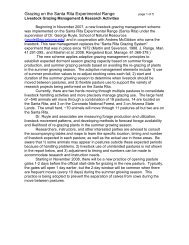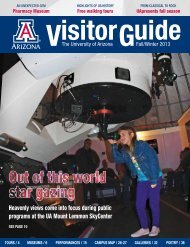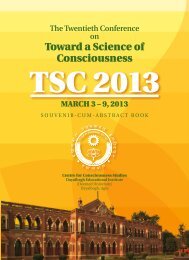CONSCIOUSNESS
Download - Center for Consciousness Studies - University of Arizona
Download - Center for Consciousness Studies - University of Arizona
- No tags were found...
You also want an ePaper? Increase the reach of your titles
YUMPU automatically turns print PDFs into web optimized ePapers that Google loves.
4. Physical and Biological Sciences 157<br />
of nature and elementary particles now supersede the role of the creator. 2. Rene Descartes<br />
takes into considering a second mindset, where the subject or the subjective model of thought<br />
is fundamental. Everything else is nothing but derived from it. 3. According to a third holistic<br />
mindset, the fundamental reality should consist of both, subject and object. Everything should<br />
be one. Everything should be connected with everything. 4. A fourth and very modern mindset<br />
neglects reality. We could call it instrumentalism. According to this way of thinking, our<br />
concepts do not reflect a single reality in any one way. Our concepts have nothing to do with<br />
reality but only with information. Buddhism refuses these four concepts of reality. Therefore<br />
it was confronted with the reproach of nihilism. If you don?t believe in a creator, nor in the<br />
laws of nature, nor in a permanent object, nor in an absolute subject, nor in both, nor in none<br />
of it, in what do you believe then? What remains that you can consider a fundamental reality?<br />
The answer is simple: it is so simple that we barely consider it being a philosophical statement:<br />
things depend on other things. For instance: a thing is dependent on its cause. There<br />
is no effect without a cause and no cause without an effect. There is no fire without a fuel,<br />
no action without an actor and vice versa. Things are dependent on other things; they are not<br />
identical with each other, nor do they break up into objective and subjective parts. This Buddhist<br />
concept of reality is often met with disapproval and considered incomprehensible. But<br />
there are modern modes of thought with points of contact. For instance: there is a discussion in<br />
quantum physics about fundamental reality. The concepts of reality in Buddhism surprisingly<br />
parallel quantum physics. More: http://ctkohl.googlepages.com P10<br />
223 Retroactive Event Determination In Consistent Histories And Relational Quantum<br />
Mechanics, Leading To Macroscopic Quantum Effects and Synchronicity Sky Nelson<br />
(Santa Rosa, CA)<br />
We suggest a pair of practical postulates which unify two current models of quantum<br />
theory (Relational Quantum Mechanics and Consistent Histories) into a broader picture of<br />
reality. By dropping the assumption that unobserved macroscopic events are “in a definite<br />
state” independent of an observer, we arrive at a surprising but consistent theory of quantum<br />
macroscopic reality (with fewer fundamental assumptions about everyday reality) that does<br />
not contradict experiment or everyday experience. As a result, we suggest a concept termed<br />
“retroactive event determination”, and extend it from a quantum principle (in CH) to a macroscopic<br />
principle. The implications of this on the phenomena of synchronicity and the question<br />
of fate versus free will are discussed. Finally, we look at how these concepts are already used<br />
in the design of multiplayer online video games in order to create an efficient and consistent<br />
model of “reality”. P10<br />
224 Quantum Computing: The First 540 Million Years David Pearce<br />
(Neuroethics Study Group, Brighton, East Sussex United Kingdom)<br />
Is the mind/brain best modelled as a classical computer or a quantum computer? No classical<br />
computer can solve the binding problem - the creation of a unified percept from widely<br />
distributed neural processing of individual object characteristics. Hence even the most sophisticated<br />
silicon robots are lame in a real-world setting. By contrast, evidence that the mind/<br />
brain is a quantum computer lies right before one’s eyes in the form of the unity of perception<br />
- an unfakeable signature of quantum coherence. The evolutionary success of organic<br />
robots depends on the ability of our central nervous system to generate dynamic simulations<br />
of fitness-relevant patterns in the environment. Unlike classical computers, organic quantum<br />
computers can “bind” multiple features (edges, colours, motion, etc) into unitary objects and<br />
unitary world-simulations with a “refresh rate” of many billions per second (cf. the persistence<br />
of vision as experienced watching a movie run at 30 frames per second). These almost<br />
real-time simulations take the guise of what we call the macroscopic world: a spectacular<br />
egocentric simulation run by every vertebrate CNS that taps into the world’s fundamental<br />
quantum substrate. Our highly adaptive capacity to generate data-driven unitary world-simulations<br />
is strongly conserved across the vertebrate line and beyond - a capacity attested by the<br />
massively parallel neural architecture of the CNS. Unitary world-simulation enables organic<br />
robots effortlessly to solve the computational challenges of navigating a hostile environment







